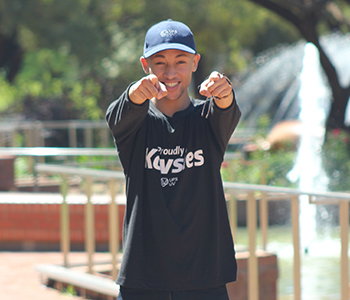
Reuben Davids, outgoing #FaceOfFacebook ambassador
for UFS digital channels
Photo: Rulanzen Martin
Reuben Davids has been our most featured #FaceOfFacebook since the campaign’s inception in 2013. As the star of more than 20 videos for the UFS digital platforms in less than a year, Reuben has been the embodiment of a Kovsie ambassador. As we say goodbye to this campus celebrity, we wish him all the best with his future plans and endeavours. Reuben shares a few thoughts with us about his term as Kovsies’ #FaceOfFacebook.
Much fun and many a lesson learnt
What did it mean to you to be the #FaceOfFacebook and how did it change your life?
“I’ve always wanted to be in front of the camera. So being the #FaceOfFacebook meant I could fulfil that dream. It changed my life in the sense that I’m much more confident now when speaking to a large audience.”
What was your most challenging moment?
“Trying to look good during a Facebook livestream. For example, on the ‘Krav Maga’ [self-defence] one. That was pretty tricky, and I had to keep my pose, regardless of the pain!”
And your funniest?
“All the bloopers we’ve ever had. Those were the funniest for me.”
Biggest lessons learnt?
“I learnt how to manage my time, to think on my feet, and how to come up with ideas in the moment and make them work.”
What advice would you give to any budding #KovsieCyberSta?
“Just come with your creativity. It’s definitely a learning experience. It’s not just work, it’s much more enjoyable! The team you are working with is amazing, so come with fresh ideas, and stay as committed as possible. It’s not hard, because it’s such a joyride.”